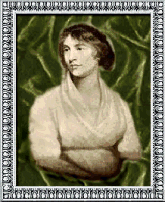

When
Wollstonecraft returned from visiting Fanny Blood in Lisbon (who dies
in childbirth there in Mary’s arms) she finds the school she set
up has failed at the hands of her own sisters. Mary then writes
Thoughts on the Education of Daughters and goes to work as a
governess for Lord and Lady Kinsborough in Ireland.
17 .
While working for the Kinsboroughs, Wollstonecraft composed Mary,
A Fiction . This work is a good example of her
early compositions .
Here is a discussion of Mary from Mary Wollstonecraft:
Writer by author Harriet Jump
18 .
"The story may be quickly told: the work is extremely brief, and
becomes increasingly sparse as it progress, suggesting that
Wollstonecraft was in some haste to reach a conclusion. Mary, the
sensitive, intelligent daughter of wealthy but unsatisfactory
parents, manages to educate herself through reading and reflection
and develops into ‘a woman, who has thinking powers’ (pg
5). She enters into a friendship with the refiend and delicate Ann -
clearly based on Wollstonecraft’s own relationship with Fanny
blood - but is disappointed to find that Ann’s feelings do not
match her own in intensity.
By her mother’s dying request she is married to a young man, who
sets off on an extended tour of Europe without consummating the
marriage. Mary accompanies the dying Ann to Lisbon in a fruitless
search for health, and is befriended by an intelligent invalid,
Henry, to whom she becomes increasingly attached. After Ann’s
death he promises to follow her to England, but his return is delayed
by worsening sickness. When he finally appears, it is clear that he
will not live long.
His last weeks are spent in Mary’s company, but her sense of
duty to her absent and unloved husband prevents any union between
them. He dies in her arms. She is unwillingly reunited with her
husband, despite an extreme physical revulsion, and she is glad to
detect symptoms of delicacy in her own health, as she believes she is
‘hastening to that world where there is neither marrying
, nor giving in marriage’ (pg 73)".
How does Mary , though poorly received and not considered a
success, reflect Wollstonecraft’s maturing politics and
philosophy? And how does her life, at the time that she was writing
Mary reflect those same modes of thinking? As noted,
Wollstonecraft composed Mary while she was working for the
Kinsboroughs. Jump argues that Mary contains "strong
elements of emotional autobiography". This can be seen in themes
that relate to the death of Fanny and her child, and parts of the
book can be related back to Mary’s relationship with her
mother.
Importantly, however, Mary was written at a time when Wollstonecraft
was daily observing the lives of an affluent and aristocratic
family-- lives with values that she did not approve of. Mary’s
time with the Kinsboroughs was brief, but what she observed there no
doubt shaped her political thought, especially one that involves the
"resentment of the power and emptiness of privileged lives" and a
dream of "financial independence"
19 ..
She travels to Eton, Dublin, and Bristol, but is dismissed from her
post in 1787 and goes to work for Joseph Johnson and the
Analytical Review
